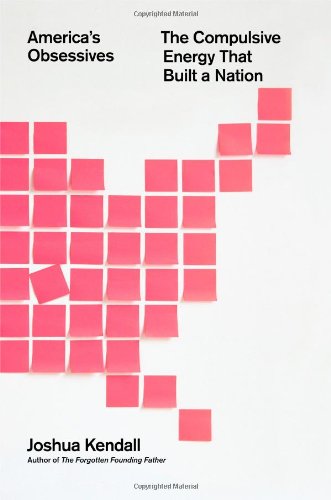
America's Obsessives
The Compulsive Energy That Built a Nation
کتاب های مرتبط
- اطلاعات
- نقد و بررسی
- دیدگاه کاربران
نقد و بررسی

Starred review from April 29, 2013
In this quirky history, journo Kendall (The Forgotten Founding Father) profiles a “ticker-tape parade of American icons” in an effort to understand how their “obsessions and compulsions... fueled their stratospheric success.” Across a range of disciplines, from sexuality to sports, these seven legendary figures revolutionized their fields, and they all likely had obsessive-compulsive personality disorder (OCPD). Kendall draws upon the good and bad in each of his subjects to paint vivid portraits of “patron saint of polymaths” Thomas Jefferson, marketing genius Henry Heinz, legendary librarian Melvil Dewey, sex scholar Alfred Kinsey, aviator Charles Lindbergh, cosmetics tycoon Estée Lauder, and baseball star Ted Williams. Kendall explores how each of these “obsessive innovators” changed the world through sheer force of will by harnessing their personal eccentricities and foibles. From Heinz’s need to measure things, to Kinsey’s broad sexual desires and Lauder’s addiction to touching faces, Kendall delves into flaws that crystalize as strengths, showing en route what made these individuals tick. It’s a compelling look at how personality disorders can rule and ruin a life, and how those who come to terms with their constraints can achieve great things. Agent: Suzanne Gluck, William Morris Endeavor.

June 1, 2013
Kendall (Associate Fellow/Trumbull College, Yale Univ.; The Forgotten Founding Father: Noah Webster's Obsession and the Creation of an American Culture, 2010, etc.) returns with a collection of minibiographies of obsessive personalities who transformed American life. The author begins with Steve Jobs (whom he calls "a tad mad"), then moves on to some other "fragmented individuals" to see where they came from, how they functioned and how they contributed. And what a motley crew: Thomas Jefferson, Henry Heinz, Melvil Dewey, Alfred Kinsey, Charles Lindbergh, Estee Lauder and Ted Williams. Kendall immediately notes the difference between obsessive compulsive disorder and obsessive compulsive personality disorder; his subjects are among those with the latter, though the two disorders are "cousins." Throughout, the author's diction fluctuates between the clinical and the conversational. Instances of the latter include Kinsey was a "neatnik," Ted Williams, "an emotional basket case." Readers will delight in the weirdness that the author has unearthed. Jefferson was an obsessive organizer and tinkerer; Heinz insisted on absolute cleanliness; Dewey was in love with numbers--and with nubile librarians; Kinsey had orgies in his house at Indiana University; Lindbergh had four separate families (several in Germany); Lauder could not keep her hands off people's faces and was secretive about her background; Ted Williams did well in high school typing class and was guilty of "nonstop nonsensical chatter." Kendall ends with some conventional comments about how we should admire what's admirable about these folks--and that America has benefitted and will benefit from the obsessives among us. Based on the evidence here? Probably not a good idea to marry one. Do we care if a professionally successful person is a psychological mess? Not, it seems, if we get out of it a great smartphone or a well-organized library. Kendall delivers a mostly engaging history of a handful of America's "obsessive innovators."
COPYRIGHT(2013) Kirkus Reviews, ALL RIGHTS RESERVED.

Starred review from June 1, 2013
Sure, there's a link between creativity and eccentricity, but what of a link between eccentricity and extreme productivity? Noted journalist Kendall explores the existence of such a link in this engaging dive into the private lives of seven of the nation's most productive individuals. According to Kendall, makeup maven Est'e Lauder, n'e Josephine Esther Mentzer, never met a face she didn't want to make over; Henry J. Heinz, of pickle fame, never met anything he didn't want to measure; and aviator Charles Lindbergh never met a woman he didn't want to, well . . . best read the book to glean all the tawdry details. These sevenincluding Apple's Steve Jobscharacterize the type of individual responsible for setting the U.S. head and shoulders above other industrialized countries by raising the productivity bar not for financial gain but for the personal satisfaction of knowing that whatever they produce is exceptional. Kendall argues that all seven had obsessive-compulsive personality disorder, or OCPD (not to be confused with obsessive-compulsive disorder, OCD), a theory for which he makes a credible case by citing little-known similarities in their backgrounds. Kendall keeps the pages flying by with graceful prose rich in intriguing details drawn from his extensive research.(Reprinted with permission of Booklist, copyright 2013, American Library Association.)

























دیدگاه کاربران